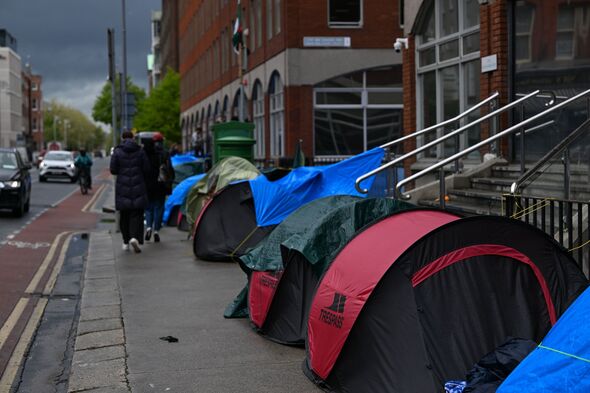A growing trend has emerged on the Belfast-to-Dublin coach route, now dubbed the “Brexit Express” due to the increasing number of asylum seekers using it to flee the UK and seek refuge in Ireland.
Drivers on the popular Dublin Express route report that each journey carries an average of eight asylum seekers making the two-and-a-half-hour trip south. This surge began about six months ago and shows no signs of slowing down, coinciding with the UK’s “Safety of Rwanda” bill, which promises to process refugee claims in the African nation.
One driver for Dublin Express shared his frustration with the recent increase in asylum seekers using fake tickets to board the coaches.
“They’re often travelling using a photograph of a ticket that has clearly been bought by someone else,” he said. “We can tell because they’re all using the same name, but it’s hard to stop because we don’t scan the tickets.” Although there are customs posts on the border, checks are infrequent, with the driver noting they “occasionally get pulled over so they can check passports and send people without them back, but not that often, maybe once a month.”
With 17 trips a day from Belfast to Dublin, and an estimated 2,125 journeys so far this year, the coaches may have transported as many as 17,000 asylum seekers in 2024 alone.
The Irish government has come under pressure to address the surge in asylum seekers, promising to return those from the UK by the end of the month.
But Irish Prime Minister Simon Harris has acknowledged that asylum seekers sent back to the UK might simply return to Ireland, presenting ongoing challenges for border control.
Louisa Santoro, head of the Mendicity Institution homeless charity in Dublin, where asylum seekers now make up 90 percent of those seeking hot meals, highlighted the complex factors driving this movement.
“Fifteen per cent of the people we help here have UK phone numbers,” she explained. “Why are they moving to Ireland? It’s not for the weather and the wonderful services. Largely, they rely on word of mouth.”
Santoro believes the issue is rooted in the aftermath of Brexit, noting that Ireland’s geographic position creates a false sense of security. “Ireland has been living under a false sense of protection thinking, ‘We are an island and the sea will provide protection’. But we have the Common Travel Area, which is protected by the Good Friday Agreement, so these things are complicated,” she said.
The Republic of Ireland’s government faces mounting pressure to curb the rising asylum seeker figures while balancing humanitarian obligations and international agreements.
